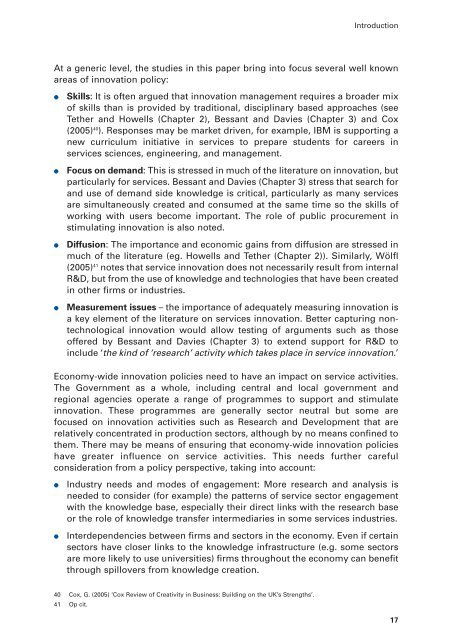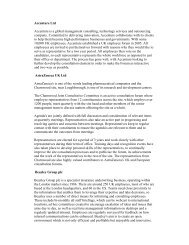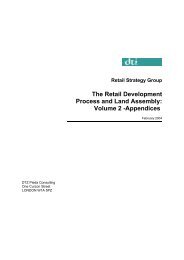Innovation in Services - Department for Business, Innovation and Skills
Innovation in Services - Department for Business, Innovation and Skills
Innovation in Services - Department for Business, Innovation and Skills
Create successful ePaper yourself
Turn your PDF publications into a flip-book with our unique Google optimized e-Paper software.
Introduction<br />
At a generic level, the studies <strong>in</strong> this paper br<strong>in</strong>g <strong>in</strong>to focus several well known<br />
areas of <strong>in</strong>novation policy:<br />
● <strong>Skills</strong>: It is often argued that <strong>in</strong>novation management requires a broader mix<br />
of skills than is provided by traditional, discipl<strong>in</strong>ary based approaches (see<br />
Tether <strong>and</strong> Howells (Chapter 2), Bessant <strong>and</strong> Davies (Chapter 3) <strong>and</strong> Cox<br />
(2005) 40 ). Responses may be market driven, <strong>for</strong> example, IBM is support<strong>in</strong>g a<br />
new curriculum <strong>in</strong>itiative <strong>in</strong> services to prepare students <strong>for</strong> careers <strong>in</strong><br />
services sciences, eng<strong>in</strong>eer<strong>in</strong>g, <strong>and</strong> management.<br />
● Focus on dem<strong>and</strong>: This is stressed <strong>in</strong> much of the literature on <strong>in</strong>novation, but<br />
particularly <strong>for</strong> services. Bessant <strong>and</strong> Davies (Chapter 3) stress that search <strong>for</strong><br />
<strong>and</strong> use of dem<strong>and</strong> side knowledge is critical, particularly as many services<br />
are simultaneously created <strong>and</strong> consumed at the same time so the skills of<br />
work<strong>in</strong>g with users become important. The role of public procurement <strong>in</strong><br />
stimulat<strong>in</strong>g <strong>in</strong>novation is also noted.<br />
● Diffusion: The importance <strong>and</strong> economic ga<strong>in</strong>s from diffusion are stressed <strong>in</strong><br />
much of the literature (eg. Howells <strong>and</strong> Tether (Chapter 2)). Similarly, Wölfl<br />
(2005) 41 notes that service <strong>in</strong>novation does not necessarily result from <strong>in</strong>ternal<br />
R&D, but from the use of knowledge <strong>and</strong> technologies that have been created<br />
<strong>in</strong> other firms or <strong>in</strong>dustries.<br />
● Measurement issues – the importance of adequately measur<strong>in</strong>g <strong>in</strong>novation is<br />
a key element of the literature on services <strong>in</strong>novation. Better captur<strong>in</strong>g nontechnological<br />
<strong>in</strong>novation would allow test<strong>in</strong>g of arguments such as those<br />
offered by Bessant <strong>and</strong> Davies (Chapter 3) to extend support <strong>for</strong> R&D to<br />
<strong>in</strong>clude ‘the k<strong>in</strong>d of ‘research’ activity which takes place <strong>in</strong> service <strong>in</strong>novation.’<br />
Economy-wide <strong>in</strong>novation policies need to have an impact on service activities.<br />
The Government as a whole, <strong>in</strong>clud<strong>in</strong>g central <strong>and</strong> local government <strong>and</strong><br />
regional agencies operate a range of programmes to support <strong>and</strong> stimulate<br />
<strong>in</strong>novation. These programmes are generally sector neutral but some are<br />
focused on <strong>in</strong>novation activities such as Research <strong>and</strong> Development that are<br />
relatively concentrated <strong>in</strong> production sectors, although by no means conf<strong>in</strong>ed to<br />
them. There may be means of ensur<strong>in</strong>g that economy-wide <strong>in</strong>novation policies<br />
have greater <strong>in</strong>fluence on service activities. This needs further careful<br />
consideration from a policy perspective, tak<strong>in</strong>g <strong>in</strong>to account:<br />
● Industry needs <strong>and</strong> modes of engagement: More research <strong>and</strong> analysis is<br />
needed to consider (<strong>for</strong> example) the patterns of service sector engagement<br />
with the knowledge base, especially their direct l<strong>in</strong>ks with the research base<br />
or the role of knowledge transfer <strong>in</strong>termediaries <strong>in</strong> some services <strong>in</strong>dustries.<br />
● Interdependencies between firms <strong>and</strong> sectors <strong>in</strong> the economy. Even if certa<strong>in</strong><br />
sectors have closer l<strong>in</strong>ks to the knowledge <strong>in</strong>frastructure (e.g. some sectors<br />
are more likely to use universities) firms throughout the economy can benefit<br />
through spillovers from knowledge creation.<br />
40 Cox, G. (2005) ‘Cox Review of Creativity <strong>in</strong> Bus<strong>in</strong>ess: Build<strong>in</strong>g on the UK’s Strengths’.<br />
41 Op cit.<br />
17
















